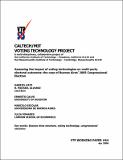| dc.contributor.author | Katz, Gabriel | |
| dc.contributor.author | Alvarez, R. Michael | |
| dc.contributor.author | Calvo, Ernesto | |
| dc.contributor.author | Escolar, Marcelo | |
| dc.contributor.author | Pomares, Julia | |
| dc.date.accessioned | 2015-04-15T12:56:36Z | |
| dc.date.available | 2015-04-15T12:56:36Z | |
| dc.date.issued | 2008-04 | |
| dc.identifier.uri | http://hdl.handle.net/1721.1/96601 | |
| dc.description.abstract | This paper presents the first study on the impact of different voting technologies on election outcomes in multi-party elections, analyzing data from a large-scale voting experiment conducted in the 2005 congressional election in Buenos Aires, Argentina. Combining different regression models and matching methods, we estimate the effect of alternative voting technologies on the probability of support for the competing parties in the elections for congress and state legislature. The results of the different statistical techniques indicate that voters are extremely receptive to the information cues provided by the different voting technologies and associated ballot designs, and that particular voting devices have a significant impact on voter choice, systematically favoring some parties to the detriment of others. We conclude that the choice of alternative electronic voting devices might have considerable effect on electoral outcomes in multi-party electoral systems. | en_US |
| dc.language.iso | en_US | en_US |
| dc.publisher | Caltech/MIT Voting Technology Project | en_US |
| dc.relation.ispartofseries | VTP Working Paper Series;64 | |
| dc.subject | Buenos Aires elections | en_US |
| dc.subject | Voting technology | en_US |
| dc.subject | Congressional elections | en_US |
| dc.title | Assessing the impact of voting technologies on multi-party electoral outcomes: the case of Buenos Aires’ 2005 Congressional Election | en_US |
| dc.type | Working Paper | en_US |
